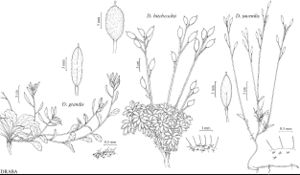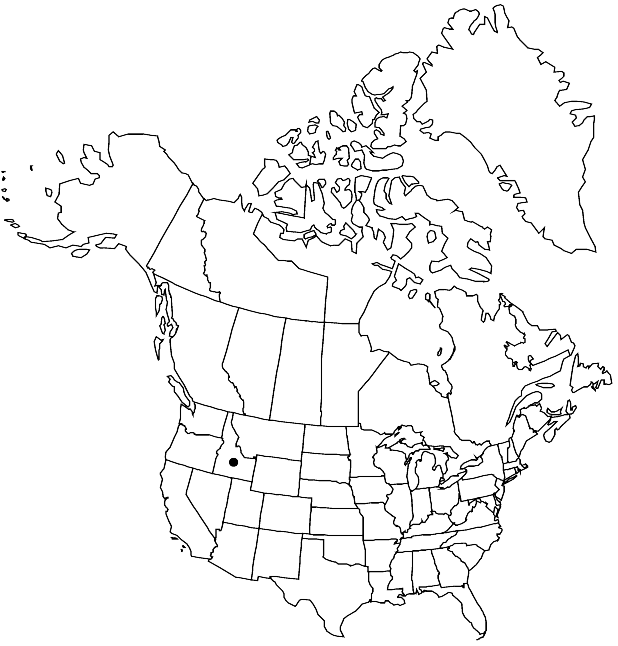Draba hitchcockii
J. Arnold Arbor. 64: 500. 1983.
Perennials; (densely cespitose); caudex branched (densely covered with persistent leaves, branches sometimes terminating in sterile rosettes); scapose. Stems unbranched, (0.1–)0.3–1(–1.3) dm, hirsute throughout, trichomes simple, 0.4–1 mm, and 2–4-rayed, 0.1–0.6 mm. Basal leaves (densely imbricate); rosulate; sessile; blade narrowly oblanceolate to oblong-linear, 0.3–1.2(–1.5) cm × 1–2 mm, margins entire, (ciliate, trichomes simple, 0.3–1.2 mm), surfaces pubescent abaxially with stalked, 2–4-rayed trichomes, 0.08–0.45 mm, (midvein obscure), adaxially glabrous proximally, sparsely pubescent distally with mostly simple trichomes. Cauline leaves 0. Racemes 4–15-flowered, ebracteate, elongated in fruit; rachis not flexuous, hirsute as stem. Fruiting pedicels ascending, straight, (2–)4–13(–18) mm, hirsute as stem. Flowers: sepals oblong, 2.5–3.5 mm, hirsute, (trichomes simple and stalked, 2–4-rayed); petals white, obovate, 5–6.5 × 2–3.5 mm; anthers ovate, 0.5–0.6 mm. Fruits ovate to broadly oblong or elliptic, plane, flattened, (3–)4–7(–10) × (2.5–)3.5–5 mm; valves pubescent, trichomes simple and short-stalked, 2(–4)-rayed, 0.06–0.5 mm; ovules 8–12 per ovary; style (0.8–)1–1.7(–2) mm. Seeds oblong, 1.4–1.8 × 0.8–1 mm. 2n = 54.
Phenology: Flowering May–Jun.
Habitat: Limestone outcrops and gravelly soil
Elevation: 1800-2200 m
Discussion
Draba hitchcockii is known from the Lost River Range in Butte and Custer counties. Based on morphological and chromosomal evidence, M. D. Windham (2004) suggested that it may be an allopolyploid resulting from hybridization between D. oreibata and D. paysonii. Draba hitchcockii is superficially similar to D. jaegeri, a taxon known from the Charleston Mountains of Clark County, Nevada. Both are cespitose perennials with relatively large, white flowers and a chromosome number (2n = 54) otherwise unknown in Draba (Windham). Features distinguishing these two taxa are provided in the discussion of 51. D. jaegeri.
Selected References
None.

